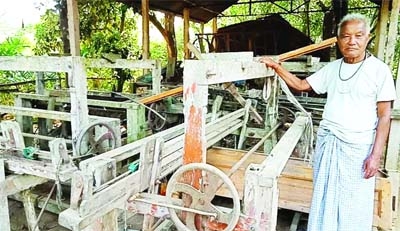
Rafiqul Islam, Sherpur Correspondent :
The weaving industry of the ethnic community is on the verge of extinction in Sherpur district. This district is on the edge of indian border and about 20,000 people of a small ethnic group live there. Keeping the tradition for hundreds of years, they made their own clothes. They used to weave sari, scarf, towel, lungi, bed sheet and other kind of cloths with their own hands. But the weaving industry of the small ethnics in the area, especially the Garo and Koch communities, has been closed due to increase of the value of yarn, labour crisis, shifting to other occupations in search of living. Looms are now being eaten by wood louse in the houses of the Garo and Koch communities.
Local people said once the sound of these looms could be heard day and night in the villages of various small ethnic groups in the Garo Hills. But now the sound is no more and it is hard to find any artisans and weavers involved in the weaving industry. Weaving machines are lying in the villages. This industry has been disappearing for the last one decade.
People of different small ethnic groups including Garo, Koch, Dalu, Banai, Hadi, Barman used to make their own traditional clothes and used them. Those who did not have looms used to buy different types of cloth made by others. Now they are bound to buy all the cloths from market.
Talking with the weavers of border area Nalitabari, Jhenaigati and Sreebardi upazila in the Garo Hills of Sherpur district, it is learned that it is still possible for them to save this traditional industry and in this regard special initiatives of the government is required. The weavers of this industry who have joined other professions need to be brought back with incentives to revive this industry.
Jagendra Koch of Rangtia in Jhenaigati Upazila said that the price of looms sari-lungi is very poor and the people of our tribe are inclined to buy the garments. As a result , their weaving looms are gradually closed down.
Zogen Koch, a small ethnic leader, said although a non government organization named Caritas once helped in preserving their traditional weaving , now it has been stopped. If we get any cooperation from the government, our tradition weaving can come back again.
SM Rejuanul Islam, an Official of Sherpur BSIC Industry said we will extend all kinds of cooperations for the heritage and weaving of small ethnic . If they come to us to protect their industry, we will provide them credit to survive the industry.

